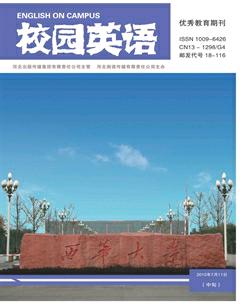The Brand Names Translation of Cosmetics Under Intercultural Communication
2015-08-10TANGHeng
TANG Heng
【Abstract】The brand names translation of cosmetics is directly related to the sales of the products and the success of the enterprises.Cultural difference is a key factor in the brand names translation.Therefore,this essay mainly discusses the brand names translation of cosmetics from the perspective of intercultural communication.
【Key words】intercultural communication; cosmetics brand; translation
I.Introduction
With the continuous development of China's economy,the commercial intercourse between China and other countries becomes increasingly frequent.Excellent brand names and good translations can bring good advertising effect and promote sales.In order to translate brand names well,it is required to pay attention to the differences of cultures between China and the West.
II.The cultural differences in the brand names translation of cosmetics
Firstly,the difference of cultural values.The western culture is multicomponent and full of changes,while Chinese people are socialized not to openly express their own personal emotions.Secondly,the difference of cultural psychology.Lots of Chinese thought and ideology are related to the family.However,the Westerners' psychological structure is relatively complex and loose.Thirdly,the difference of the way of thinking.Chinese brand names emphasize intuitive thought,while Western culture prefers logical thinking.Fourthly,The difference of the humanistic environment and customs.
III.The brand names translation of cosmetics under intercultural communication
A.Transliteration.Transliteration means to convert the characters of one alphabet to the corresponding characters of another alphabet; it is to translate the brand names according to its pronunciation.When transliterating an English brand name into Chinese,the new name will be constructed by using Chinese characters with similar pronunciation to the English one.Althouth the words are not accord with the rule of chinese characters,the choosing of the words is special.For example,Lancome is transliterated as “兰蔻”.The transliterated name not only fits the meaning of the source of plants,which is implicated in the original name,but also attracts lots of women by its imagery of youth.
B.Literal translation.As for brand name translation,literal translated brand names would greatly inspire the consumers' favorable associations and turn the potential purchase into a real action.Literal translation is applied only if there are correspondent words in the target language.For example,“ Natural Beauty” is literal translated as “自然美” and “Fair Lady” is literal translated as “贵夫人”.
C.Free translation.Free translation is carried out on the basis of the meaning of the brand.Those free translated brand names can vividly display the products utility and are easy for the consumers to remember.Although the meanings of free translated brand names are quite different from original ones,they are as beautiful as the original ones.For example,“BIOCEAN” is free translated as “欧纯”.When translating it into Chinese,neither transliteration nor literal translation can work well,while the free translated name overcomes all the shortcomings.
D.Sound-meaning mixture.Sound-meaning mixture is a target oriented translation approach.By this approach,brand names consist of a word or words part of which contains the pronunciation and the other part the meaning.As for “Clean & Clear”,it is translated as “可伶可俐”.The translated name not only keeps consistent with the original one in rhyme,but also keeps the meaning of it.
E.Non-translation.Some brands enter a foreign culture just with their original brand name,and this situation is called “non-translation”.On many occasions,some brands are made up of letters,numbers,or combination of the two,and they enter a foreign market with their original forms,for eye-catching and they are usually easy to remember.Examples are “SK-Ⅱ”,“DHC”,“ZA”,etc.
IV.Conclusion
The brand names translation of cosmetics must keep the distinctive national features and charm of the brand names themselves on the basis of respecting the cultural tradition of the market.During the process of translation,the cultural loss and distortion should be reduced to the least with the translators' efforts.In the brand names translation of cosmetics,it is especially obligatory that translators learn something from intercultural communication.
References:
[1]Blackett,Tom.,Trademarks,(New York:MacMillan Press Ltd.,1998).
[2]Murphy,John M.,Brand Strategy,(New York:Prentice-Hall,1990).
[3]范仲英.实用翻译教程[M].北京:外语教学与研究出版社,2005.
[4]张婧.接受美学视角下女性化妆品商标的翻译[J].安徽文学, 2009,(6):125-126.
[5]张凌.化妆品商标翻译探讨[J].商场现代化,2009,(1):174-175.
作者简介:汤恒(1988—),女,四川金堂人,四川外国语大学成都学院助教,研究方向:翻译。
